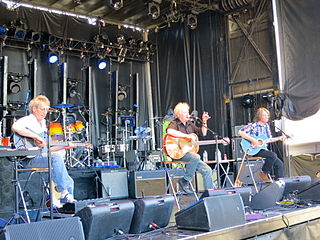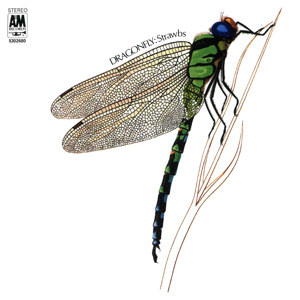Related Research Articles

Strawbs are an English rock band founded in 1964 as the Strawberry Hill Boys. The band started out as a bluegrass group, but eventually moved on to other styles such as folk rock, progressive rock, and (briefly) glam rock.

From the Witchwood is the fourth album by the English band Strawbs. It was recorded at Air Studios in London during February and March 1971 and reached number 39 in the UK Albums Chart on 17 July 1971.

Just a Collection of Antiques and Curios is the third album by the Strawbs, mostly recorded live at the Queen Elizabeth Hall in London on 11 July 1970. The album reached number 27 in the UK Albums Chart.

Dragonfly is the second studio album by English band Strawbs. It contains the lengthy and rather progressive ballad "The Vision of the Lady of the Lake" describing the hardships of a boatman who encounters and battles a variety of mystical creatures on a lake, with a sword that was given to him by the lady of the lake. The album marked the first collaboration of Rick Wakeman with the band, though he only played on one song on this album, piano on The Vision of the Lady of the Lake; he would eventually join them on their next album, Just a Collection of Antiques and Curios, in 1970. Tony Visconti also played flute on two other songs.

Grave New World is the fourth studio album by English band Strawbs, their fifth overall. It was the first album to be released after the departure of Rick Wakeman, who was replaced by Blue Weaver, late of Amen Corner.
"Benedictus" is a song by English band Strawbs featured on their 1972 album Grave New World.
"Here It Comes" is a song by the English band Strawbs. It did not appear on any of their studio albums, but it was included on two compilation albums: Strawbs by Choice and Halcyon Days. Written by bandleader Dave Cousins, "Here It Comes" shows definite pop influences and a more commercial view to song-writing, a trait that would extend to the next single, "Lay Down".
"The Man Who Called Himself Jesus" is a song by English band Strawbs written by Dave Cousins. It appears on their album Strawbs. An alternative mix of the song may be found on the 2006 box set A Taste of Strawbs.

Ringing Down the Years is the 14th studio album by English band Strawbs. The album was released initially only in Canada. Because of the record company's request that a Canadian song be included on the album, the track "Might as Well Be on Mars" written by members of the Pukka Orchestra was included.
"Oh How She Changed" is a song by English band Strawbs written by Dave Cousins and Tony Hooper. It was the first single to be released by Strawbs and later appeared on their 1969 album Strawbs. An alternative mix of the song appears on the 2006 box set A Taste of Strawbs and a re-working on 2009's Dancing to the Devil's Beat.
Anthony Hooper was an English singer-songwriter and musician. He was best known as a founder-member of Strawbs together with Dave Cousins and double bassist Ron Chesterman. He left The Strawbs in 1972 after their album Grave New World, when it became obvious that the band was moving further away from its folk roots towards rock and progressive rock. He rejoined for a 10-year stint in 1983. Hooper had been the guitarist in the Ceilidh and barn dance band, Pitchfork, since 1986, and was also a member of Misalliance.

A Taste of Strawbs is a box-set album by Strawbs. Instead of being a "best of" album, the compilers have attempted to present alternative versions of some well-known songs plus some previously unreleased material.

Painted Sky is a live album by Acoustic Strawbs.
"Queen of Dreams" is a song performed by English band Strawbs and written by Dave Cousins. The track first appeared on the 1972 Grave New World album.
"New World" is a song by English band Strawbs written by Dave Cousins. The track first appeared on the Grave New World album.
"The Flower and the Young Man" is a song by English band Strawbs written by Dave Cousins. The track first appeared on the Grave New World album.
"Tomorrow" is a song by English band Strawbs credited as a band composition with the main idea by Dave Cousins. The track first appeared on the Grave New World album.
"On Growing Older" is a song by English band Strawbs written by Dave Cousins. The track first appeared on the Grave New World album, although it was written and recorded a few years earlier. The original recording was later released on the Strawberry Sampler Number 1 album.
"I Only Want My Love to Grow in You" is a song by English band Strawbs featured on their 1976 album Deep Cuts.

Recollection is a live album by Strawbs. The tracks were recorded in 1970 on a tour supporting Roy Harper just prior to the concert at the Queen Elizabeth Hall.